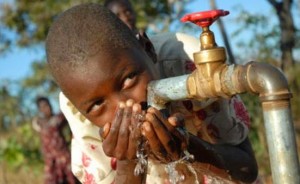CSOs urged to partner government – WASH
 Civil Society Organisations (CSOs) have been urged to partner government for collective action towards achieving Water, Sanitation and Hygiene (WASH) Sustainable Development Goals (SDGs).
Civil Society Organisations (CSOs) have been urged to partner government for collective action towards achieving Water, Sanitation and Hygiene (WASH) Sustainable Development Goals (SDGs).
A statement issued by IRC, an international think-and-do tank, and copied to the Ghana News Agency on Wednesday said one significant issue facing developing countries, of which Ghana was no exception, in the area of WASH was the waning funding to the sector.
It said Ghana’s case was even more complicated, considering the country’s recent reclassification as a lower middle income country.
It noted that though this might present opportunities for the WASH sector, it could initially constrain the sector’s ability to attract funding, especially when about 90 per cent of the sectors’ funding came from loans and grants.
Explaining the funding challenges that confront the WASH sector and the need to explore partnership opportunities to carry out effective advocacy to ensure the achievement of the WASH SDGs, the Country Director of IRC, Mrs Vida Duti, said there was a decline in donor funding to the sector; and because most of the programmes in the WASH sector were ongoing, sector actors may not feel the impact, stressing, “but we should be preparing and looking at how as a sector, we can adjust to make collective impact.”
In a presentation to kick start the learning session on advocacy issues around capacities, innovative financing and exploring partnerships for collective action towards achieving WASH SDGs at the 27th Edition of the Mole Conference at Big Ada in Ghana, Mrs Duti said doubling funding for the WASH sector through domestic resource mobilization was critical for an unimpeded SDGs implementation.
However, she noted that the outlook and drivers for domestic resource mobilization, currently does not look favorable for the sector and therefore called for a more concerted efforts among stakeholders in the WASH sector to manage the transition in order to avoid budget slippages.
The changing funding and partnership landscape, according to the IRC Ghana Country Director, had a lot of implications for advocacy work among CSOs in the WASH sector in Ghana.
She said the numerous complexities being experienced in the sector has a waning impact on WASH sector dynamism and “so the question is that how can we remain dynamic in a sector that is losing its dynamism,” she asked.
On how to use advocacy to drive the SDG agenda, Mrs Duti, said CSOs should partner government to redirect the path to achieving the SDGs on WASH.
“We cannot sit back and say this is government business, it’s every body’s business, but the government is supposed to lead and therefore, we need to look at how together we can work to support government in driving the agenda towards achieving the SDGs targets,” she said.
Mrs Duti who spoke on the theme “Overview of Step-Change-for-WASH… Forging Partnerships for SDGs and Follow-Up Discussions,” advised stakeholders to reflect on critical issues in the sector, especially on best practices other partners were implementing and achieving results that others could learn from to drive the advocacy agenda. “Move out from lamentations and begin to reflect on how to build synergies around advocacy so that collectively, we can move the WASH sector forward,” she urged.
Mole Conference is one of the biggest Multi-Stakeholder annual platforms in the WASH sector in Ghana.
The Platform, named after the venue of the maiden edition, Mole in the Northern Region of Ghana, is organized by the Coalition of NGOs in Water and Sanitation (CONIWAS) and brings together sector practitioners from NGOs, Government, Private Operators, Networks, CBOs, and CSOs to dialogue, learn and share knowledge/information on specific themes that affect the sector.
Source: GNA
